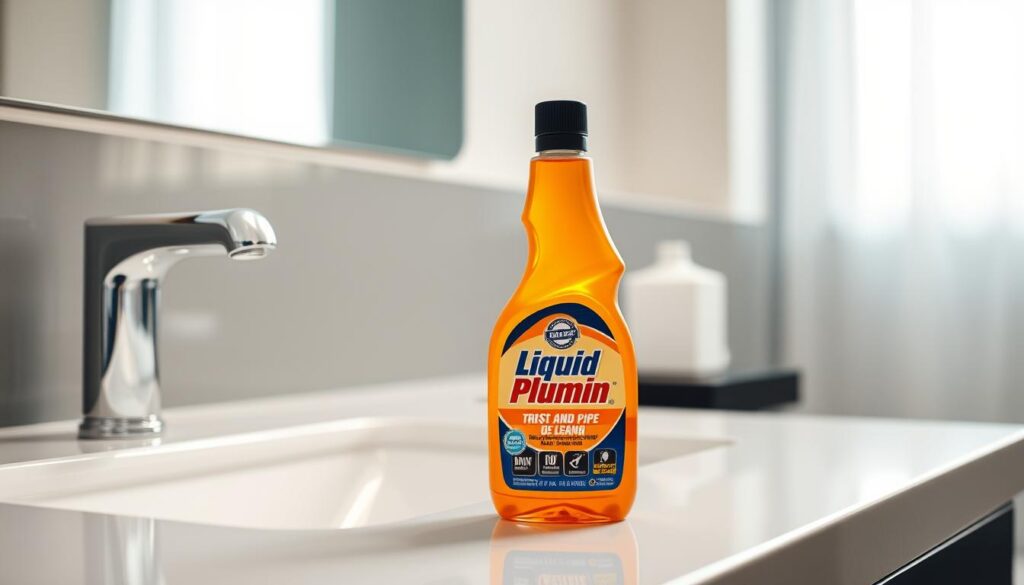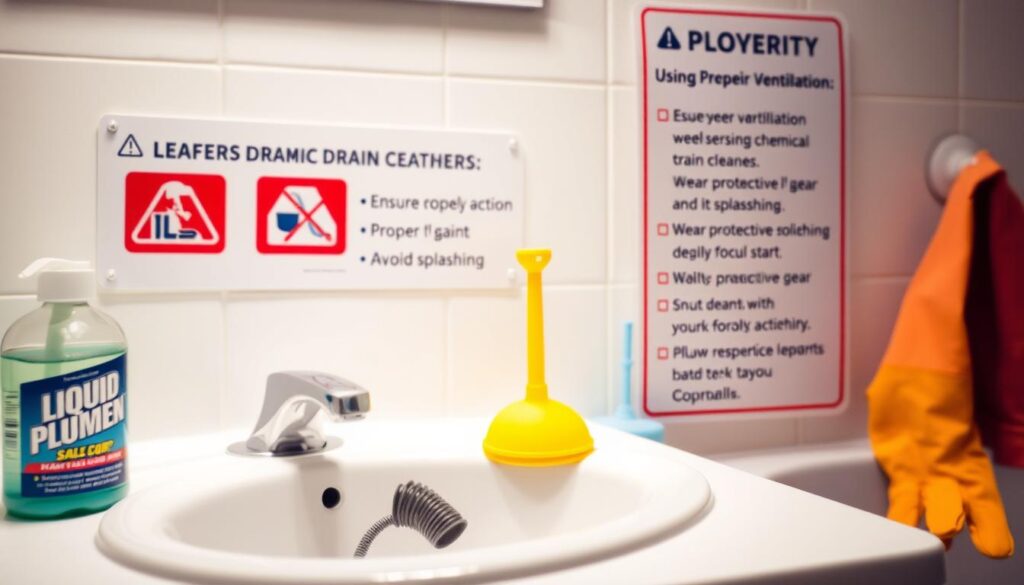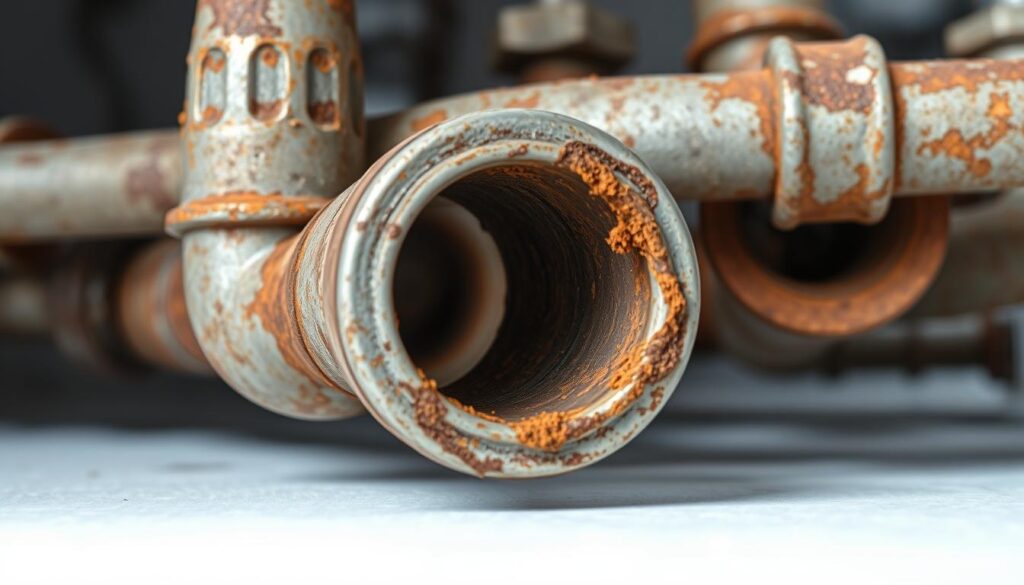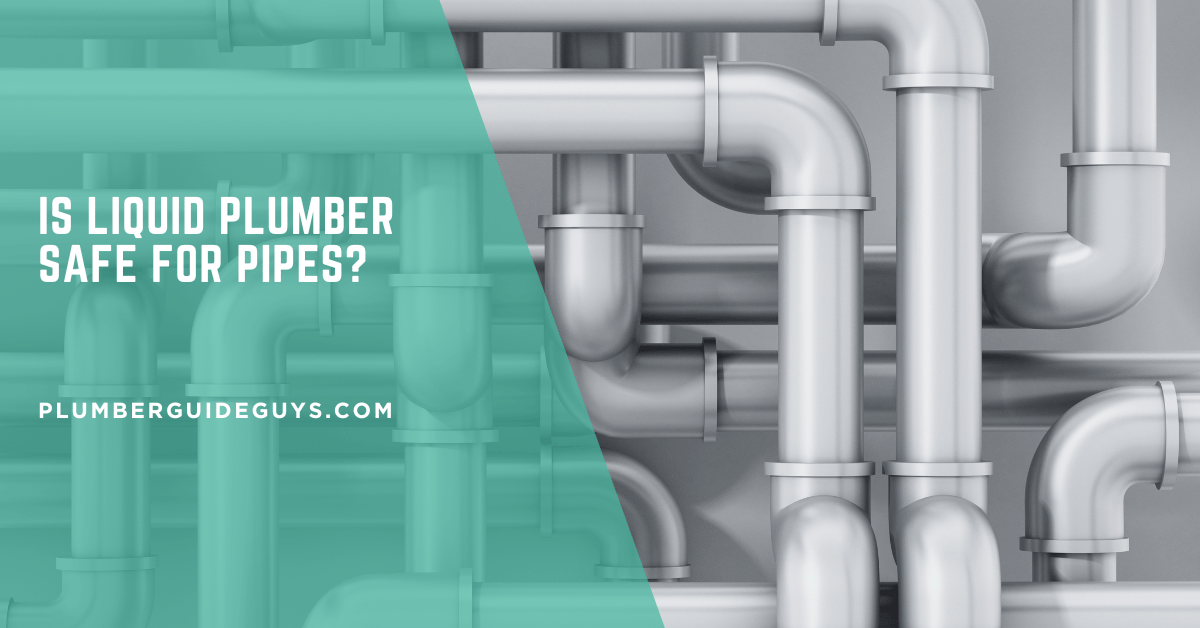Affiliate Disclosure
Plumber Guide Guys is a participant in the Amazon Services LLC Associates Program, an affiliate advertising program designed to provide a means for sites to earn advertising fees by advertising and linking to Amazon.
Is Liquid Plumber Safe for Pipes? Ever thought about how fast drain cleaners might harm your home’s pipes? Chemical drain cleaners like Liquid Plumber clear clogs quickly. But, they might damage your pipes without you knowing.

Many homeowners wonder: is Liquid Plumber safe for pipes? These chemicals can clear blockages fast. But, they also pose risks that might surprise you. It’s important to know how to protect your pipes while fixing clogs.
Liquid Plumber can damage pipes if the chemicals react badly with them. Your home’s plumbing is unique. What works for one pipe might harm another.
Key Takeaways
- Chemical drain cleaners can potentially damage pipe materials
- Different plumbing systems react uniquely to chemical treatments
- Understanding pipe composition is key before using drain cleaners
- Getting professional advice can avoid expensive repairs
- There are safer ways to clean drains
Table of Contents
Understanding Liquid Plumber and Its Chemical Composition
Dealing with tough drain clogs can be tricky. Chemical drain cleaners like Liquid Plumber offer a strong solution. They are made to handle stubborn blockages in your plumbing.
Safe drain cleaners need a deep understanding of their chemistry. Liquid Plumber has two key ingredients. They work together to break down organic matter and clear blockages in your pipes.
Core Chemical Components
The two main chemicals in Liquid Plumber are:
- Sodium Hypochlorite
- Sodium Hydroxide
Breaking Down Clog Mechanisms
These chemicals react with organic materials in complex ways. Sodium hydroxide breaks down greasy substances. Sodium hypochlorite oxidizes and breaks down complex organic compounds that clog your pipes.
“Chemical reactions are the unsung heroes of drain cleaning” – Plumbing Science Quarterly
The effects of these chemicals turn solid blockages into liquids. This makes it easy for them to flow through your plumbing system. It’s a powerful way to solve persistent clogs.
Scientific Interaction Process
When used, these chemicals create heat and start breaking down molecules. This powerful cleaning action targets the debris in your pipes.
- Breaks down organic matter
- Generates heat to accelerate dissolution
- Creates a liquid solution from solid blockages
Knowing how these chemicals work helps you choose the right drain cleaners for plumbing maintenance.
Is Liquid Plumber Safe for Pipes?
Homeowners often wonder if liquid plumber is safe for their pipes. The safety of these cleaners depends on several important factors. These factors can affect your plumbing system’s health over time.
Liquid plumber has strong chemicals to quickly break down clogs. Experts say these products can corrode pipes if used too much or wrong. Different materials in pipes react differently to these cleaners:
- PVC pipes can get damaged by harsh chemicals
- Metal pipes may corrode faster
- Older plumbing systems are more likely to degrade
Whether liquid plumber corrodes pipes is a complex issue. While it might seem okay to use it sometimes, using it too often can harm your pipes. The heat from chemical reactions can weaken pipes, mainly in older systems.
Professional plumbers suggest using chemical cleaners less and choosing safer methods.
Before using liquid drain cleaners, think about how often you use them, the type of pipes you have, and the long-term effects. Instead, consider safer ways to clear clogs, like prevention and mechanical methods.
Potential Risks to Different Types of Plumbing Materials
It’s important to know how liquid plumber affects different plumbing materials. This knowledge helps keep your home’s plumbing safe. Each material reacts differently to chemical drain cleaners, which can cause damage if not used right.
PVC Pipe Vulnerabilities
Liquid plumber can be tough on PVC pipes. The chemicals in it might weaken the pipes over time. This can lead to:
- Softer pipe walls
- Small cracks
- Weaker pipes
Metal Pipe Complications
Metal pipes have their own set of problems with chemical drain cleaners. Pipes made of copper or galvanized steel might:
- Corrode faster
- Have weaker joints
- Be more likely to leak
Older Plumbing System Considerations
Older plumbing systems are extra sensitive to chemical drain cleaners. Aged pipes with existing wear may deteriorate faster when exposed to harsh chemicals. If you have an old home, be extra careful and think about other ways to clean drains.
Professional plumbers suggest checking pipes regularly before using chemicals.
Safety Precautions When Using Liquid Plumber

Using chemical drain cleaners like Liquid Plumber needs careful safety steps. Protecting your pipes and yourself is key to avoiding health risks. It also helps keep your plumbing in good shape.
Before you start cleaning the drain, make sure you have the right gear:
- Chemical-resistant rubber gloves
- Safety glasses or protective eyewear
- Long-sleeved clothing
- Respirator mask or face covering
Using safe drain cleaners means you need to control the environment. Work in a place with good air flow, like near a window. Keep the cleaner out of reach of kids and pets, in a locked cabinet or high shelf.
Being ready for emergencies is important when using chemical cleaners. Remember these first-aid tips:
- Skin contact: Rinse with cool water for 15 minutes
- Eye exposure: Flush with water for at least 20 minutes
- Ingestion: Call poison control right away
Pro tip: Always read the manufacturer’s instructions carefully before using any chemical drain cleaner to ensure maximum safety and effectiveness.
Your safety is the most important thing when working with strong chemical drain solutions.
Proper Application Methods and Dosage Guidelines
Using chemical drain cleaners like Liquid Plumber needs careful attention. It’s important to know the right way to use it to avoid damaging your pipes. This way, you can get rid of tough clogs effectively.
Opening and Preparing the Product
Following the instructions closely can help avoid problems. Here’s how to open the container:
- Push the cap down firmly
- Turn counterclockwise to unlock
- Remove cap carefully
Recommended Treatment Duration
Timing is key when using Liquid Plumber. Never leave the product in pipes longer than recommended. The time needed varies from 15 to 30 minutes, based on how bad the clog is.
Application Process
Here’s how to use it for the best results:
- Pour the right amount directly into the drain
- Let it sit for the time suggested
- Flush well with warm water
- Rinse the drain completely
Always read the instructions and wear protective gear. This ensures safe and effective cleaning of your drains.
Signs of Pipe Damage from Chemical Drain Cleaners

Chemical drain cleaners, like Liquid Plumber, can harm pipes if used wrong or too often. It’s key to spot early signs of corrosion to keep your plumbing in good shape. This helps avoid expensive fixes later on.
Spotting pipe damage needs careful watching for certain signs. Does Liquid Plumber corrode pipes? It depends on several things, but some clear signs can show if there’s a problem:
- Persistent slow drainage after many treatments
- Unusual metallic or chemical smells from drains
- Visible pipe color change or wear
- Water leaks near treated drain spots
- Strange sounds like gurgling or bubbling
Knowing these symptoms helps figure out how bad the damage is. Different materials react differently to these cleaners. So, getting a pro’s opinion is very important.
| Pipe Material | Damage Indicators | Recommended Action |
|---|---|---|
| PVC Pipes | Softening, warping, discoloration | Immediate professional inspection |
| Metal Pipes | Corrosion, pinhole leaks, rust | Replace affected sections |
| Older Plumbing | Accelerated deterioration | Complete system evaluation |
Warning: Persistent pipe damage can lead to expensive plumbing repairs and possible home structural issues. When unsure, get a professional plumber to check your situation.
Alternative Drain Cleaning Solutions
Chemical drain cleaners can be risky for your plumbing. It’s important to find safe alternatives. Many options can clear clogs without harming your pipes.
Natural cleaning methods are gentle yet effective. They help avoid harsh chemicals. Your pipes will stay clear and work well.
Natural Household Remedies
- Baking soda and vinegar solution: Creates a powerful fizzing action that breaks down minor blockages
- Boiling water flush: Helps dissolve greasy buildup and organic materials
- Salt and hot water mixture: Works as a mild abrasive cleaner for light clogs
- Enzyme-based drain cleaners: Utilize natural bacteria to eat through organic blockages
Professional Plumbing Solutions
For tough clogs, professional solutions are best. They clean thoroughly without damaging pipes.
- Hydro jetting: High-pressure water stream removes tough blockages
- Mechanical snaking: Specialized tools navigate and clear pipe obstructions
- Camera inspection: Precisely locates and diagnoses drainage issues
Knowing about these alternatives helps protect your plumbing. Professional plumbers can suggest the best option for your needs.
Maintenance Tips to Prevent Future Clogs
Keeping your pipes safe from chemicals starts with regular maintenance. Your home’s plumbing needs care to avoid clogs and harsh cleaners. Smart strategies can keep your plumbing safe and save you money on repairs.
Here are key maintenance tips to keep your drains flowing:
- Install drain screens in sinks, showers, and tubs to catch hair and debris
- Flush drains weekly with hot water to remove buildup
- Avoid pouring grease, coffee grounds, and food scraps down kitchen drains
- Use enzymatic drain cleaners as a gentle alternative to harsh chemicals
Regular checks by plumbers are vital for pipe protection. They spot early signs of blockages and do maintenance to prevent big problems.
Make cleaning a regular habit, focusing on gentle, natural methods. Baking soda and vinegar are great for cleaning drains without harming your pipes. Remember, it’s cheaper to prevent problems than to fix them.
Invest time in maintenance today to save money and stress tomorrow.
When to Avoid Using Liquid Plumber
It’s important to know when not to use liquid plumber on pipes. This helps keep your plumbing system working well. Liquid plumber is good for small clogs, but some situations need more care.
Knowing when to skip chemical drain cleaners is key. This prevents damage to your plumbing. Using liquid plumber on PVC pipes needs extra attention.
High-Risk Situations to Avoid Chemical Drain Cleaners
- Complete pipe blockages that prevent water flow
- Suspected pipe damage or structural weaknesses
- Older plumbing systems with fragile pipes
- Septic system connections
- Pipes with existing corrosion or wear
Dangerous Product Interactions
Chemical mix-ups can be dangerous. Never combine liquid plumber with:
- Ammonia-based cleaners
- Toilet bowl cleaners
- Acid-based products
- Other drain opening solutions
Compatible Plumbing Systems
Check your pipe material before using any chemical cleaner. Metal pipes and newer PVC systems react differently. If unsure, get a professional plumber’s advice.
Keep your pipes safe by knowing their limits. Choose the best cleaning method for your situation.
Conclusion
Figuring out if liquid plumber is safe for your pipes needs a close look at your plumbing setup. Different pipes and their ages can react differently to chemical cleaners. It’s key to check your home’s pipes before using any cleaners.
Choosing the right drain cleaners is important. Liquid plumber works well for small clogs, but using it too much can harm your pipes. Plumbers suggest other ways to fix big clogs to avoid damage.
Preventing problems is the best way to keep your pipes in good shape. Clean your pipes regularly, avoid harsh chemicals, and get professional checks. If you have tough clogs, a pro can fix them safely.
Knowing what your pipes need helps you make smart choices. Mixing chemical cleaners with expert advice keeps your pipes safe. This way, your home’s plumbing stays healthy and works well for a long time.

